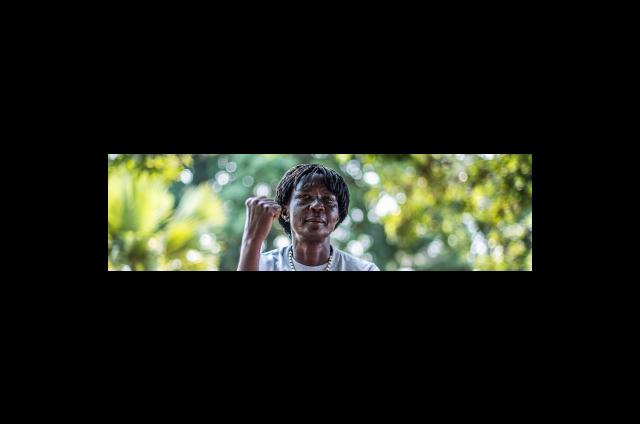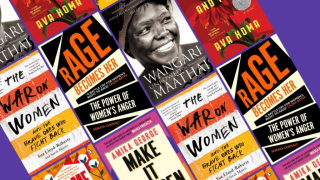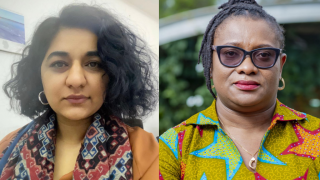How the Women in our Country Offices are Using Their #PowerToChange
Women have the #PowerToChange the world. We see it happen all the time. In the face of inequality and conflict, women make small, positive changes which in time have a lasting impact on their families, on their communities and on society as a whole.
On International Women’s Day 2022, we want to elevate the voices of the changemakers in the countries we work. These are women who are demonstrating their #PowerToChange social norms and are committed to creating a ripple effect for generations to come.
The power to make a small but mighty difference lies within all of us.
Khalida Khalo Lazgeen
I am Khalida. I graduated from college with a degree Water Resources Engineering, I am married, living in Iraq, the Kurdistan Region. Since 2016, I have worked with different NGOs. The work I am most proud of is my work supporting marginalised women and survivors of gender-based violence.
What inspired you to work for women’s rights, in the fight for gender equality?
I have lived in this community all my life. I see the inequality between women and men in my society, and all over the world - the violence that women face in their lives, those who are being killed over honor, raped, beaten, and more. Who will speak for them, who will reach their voices to justice?
If we as women do not support each other, who will?
We are the only ones who understand each other and can hold each other's hands and make the change we want to see.
Have you witnessed women in your life or region with the power to change?
I have seen many success stories from our programme at Women for Women International. At the beginning, many of the women we work with have no trust in themselves. They wonder how their lives will change. Who will hold their hands? How will they gain a source of income for themselves?
But there are two graduates who now working with us as trainers - they train other participants on vocational skills and they share their experiences with participants. They share how our Stronger Women, Stronger Nations Programme was an opportunity for them to have their own work and income, to support their families. One of them is now a sweet-making trainer and has opened an online page on social media. She receives many orders from customers and makes sweets from home to sell.
Another graduate is a woman who was married at a young age, without any income. Her husband also had no work and their financial situation was very bad. She didn’t have enough money to pay for a doctor and treatment. Since joining our programme, she has become very skilled at making handmade materials and putting netting on clothes. She found a job with a talented dressmaker, and this made her very happy. It changed her situation after gaining an income through her own skills.
What is the one change you would like to see in your society when it comes to women’s rights?
The main social and economic challenge that women face is that most women don’t have any income. She can't depend on herself. Even educated women and girls are not free to choose what work to involve themselves in due to cultural traditions and gender roles. The issue of women not earning money has become the cause of social challenges. She always needs another person to take care of her, and, most of the time, that person is a man - her husband, brother, or father.
In turn, this makes women weak in eyes of society and men take control of their lives too easily, denying them their basic needs. Women suffer all kinds of gender-based violence by their husbands or family members but they can’t get divorced or separated, because they know they can’t take care of themselves or their children without an income. There are some societies that don’t give any inheritance to women. There are many women who have great ideas for business projects, but they don’t have the support to develop and implement their ideas to earn money and to become businesswomen. Their dreams evaporate.
So, the change I want to see is for women to increase their skills and for society to open up opportunities for women by supporting their ideas of business and engaging women in marketing. In this way, the load of the family will be divided equally between women and men, and this process will strengthen women socially. Her participation in decision-making will increase, she will be more valuable in society and in her family than before, and traditional gender norms will be decreased. As soon as women get involved in business, it will improve their economic lives.
Women will be able to support their family and community by having an income, and it will develop the country's economy.
Latifa Faqirzada
Who am I? I am a girl with a wheaten face and eyes full of pain. I may be delicate, but I am not weak, Yes, this is me Latifa Faqirzada, Global Advocacy and Policy Advisor at Women for Women International and advocate for marginalised women in Afghanistan for almost 10 years. I have received appreciation letters as the best employee from Afghan Women Network and Independent Election Commission.
What inspired you to work for women’s rights, in the fight for gender equality?
I grew up in a traditional and religious society. From childhood, I faced gender inequality, violence against women, and the violation of women's rights. I suffered from all these things and I decided to continue my education and work with activists to create new laws and regulations to save women's rights and serve marginalised women to help them develop their self-sufficiency and bring changes in their live.
Have you witnessed women in your life or region with the power to change?
When I started working for women's rights, we were working with civil society to create a new law for the elimination of violence against women. We faced opposition in the form of religious members of Parliament. We advocated for this law's approval and, fortunately, we succeeded and the President signed it. After a few years, the Afghanistan government decided to add parts of it to the criminal code, and to remove it. Again, we started advocating to ensure the protection of women's rights. We eventually saved this law and the Government assigned special Attorney Generals and courts in the Judiciary system of Afghanistan for its implementation.
When I start working with Women for Women International, we worked with groups of Change Agents in Kapisa Province. They conducted an advocacy campaign against bad customs and cultures with more than 160 women and men in their community. They published a statement with their signatures to restrict bad customs and cultures.
Another group in Nangarhar Province had several advocacy meetings with religious leaders for the establishment of Madrasa (an educational institution) for women and girls. It took a long time, but they succeeded.
I have worked with very many women. Their power to change has brought a lot of changes in their family, community, society, and country.
What is the one change you would like to see in your society when it comes to women’s rights?
As an Afghan girl, I have lots of concerns about women and girls in Afghanistan. I can see a girl hanged, I can see women wrapped in black, I can see an eight-year-old girl sold due to poverty, I can see a migrant woman frozen in the snow, I can see a baby who was lost at the airport during the evacuation, and I can feel all this pain with my soul.
I want peace for Afghanistan and I want all Afghan women and girls to have all human and women's rights.
The girls should be able to continue their education in a safe and secure environment, and women must have freedom of choice, to dress and work as men and other women in the world. This problem will be solved when the international community, especially UN Women, urges the government of the Islamic Emirate to secure human and women's rights in Afghanistan.
Being a woman requires greatness of soul in Afghanistan!
Zainab Gbobaniyi
I am a lawyer, and a human rights advocate with a passion for the promotion and protection of women’s rights. I am a mother of two.
I live in Jos, Plateau State, Nigeria. I believe that the rights of women should not be relegated to the background, but at the front and centre of discussions.
What inspired you to work for women’s rights, in the fight for gender equality?
The society I grew up in has a culture and practice that never gives a woman the right to be educated or to be part of decision-making. The male children are given priority in every aspect of the family. Girls will just grow up and be married off to serve their husbands. And the cycle of poverty continues.
As a child, I saw the plights of girls older than me, and I never wanted such a kind of life.
I started questioning such norms and the culture and there about made up my mind to study law, so I can champion the cause of those who cannot speak for themselves and especially to bring to the forefront the injustice of denying women their rights for the simple reason that they were born a woman, which we are not in a position to choose.
Have you witnessed women in your life or region with the power to change?
Women are making a lot of difference using their voices. In the past, women didn't even know that they had rights. Today. women are speaking out against gender-based violence and other issues of concern. They are advocating for the involvement of women in all aspects of decision-making, including peace and security, governance and so many others.
What is the one change you would like to see in your society when it comes to women’s rights?
The rights of women should not be relegated.
Women's rights should be taken seriously, as fundamental rights without any discrimination. Women should be involved in all aspects of society and not left behind.
A society where women are involved develops faster.
How will you use your #PowerToChange?
For Sama: Virtual Film Screening and Q&A
subtitle:
As part of #WomensHistoryMonth we held a virtual film screening of the BAFTA-winning and Oscar-nominated documentary For Sama, followed by a panel discussion and Q&A.
Women's History Month Book List
subtitle:
Feed your mind this Women's History Month with books from women writers. Their powerful words and stories honour women throughout history and across the globe - their lives, experiences and courage to drive change.
Meet Chro and Buki
subtitle:
Women have the #PowerToChange the world. We see it happen all the time. In the face of inequality and conflict, women make small, positive changes which in time have a lasting impact on their families, on their communities and on society as a whole. Meet Buki and Chro, two members of our global team who are using their power to create a ripple effect of change.



